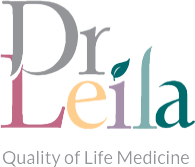Inflammation
Reversing Inflammation

Inflammation is at the root of many of our modern-day diseases, including diabetes, heart disease, hypertension, arthritis, and even cancer. Scientists project that for the first time, the current generation will live shorter lives than their parents. The number of patients struggling with various diseases continues to increase. Inflammation damages arteries and dysregulates our metabolism, causing obesity and increased blood sugar. It also alters our immune system, making it harder for us to fight off illness and cancer. However, not many people know that we can reverse inflammation!
Several factors lead to increased inflammation. Fortunately, most are treatable.
Stress
Stress from psychological (time, money, relationships), physical (not enough sleep, over-exertion), or environmental (toxins) issues increases inflammation. Evolutionarily, we were meant to fight tigers, not our prolonged, ever-constant stress.
Vitamin D
Our skin produces the essential vitamin D when we are exposed to sunlight! Vitamin D is a hormone that supports bone health and also modulates the immune system. When we are low in vitamin D, we have increased inflammation.
Sex Hormones
Natural, bio-identical hormones – estrogen for women and testosterone for men – are the most effective anti-inflammatories. Traditional Hormone Replacement Therapy (HRT) consists of estrogen and testosterone molecules that are not identical to the molecules our bodies produce, and therefore cause different reactions.
Environmental Toxins
Our environment is filled with chemicals and toxins, such as additives and preservatives in food, phthalates in plastics, and heavy metal found in gasoline fumes, our fish supply, dental amalgams, cigarette smoke, and industrial pollution, all of which can lead to inflammation.
Genetics
Each individual has genetic susceptibilities, or a “weak link” in how our bodies interact with our environment. Increased inflammation for some can lead to thyroid issues; for others, heart disease. However, our genes are only 20% of our health, whereas environmental factors comprise 80%. Fortunately, we can change our environment, thereby changing which genes are expressed. No one is doomed to their parents’ diseases.
Food Allergies
Food allergies can lead to inflammation. The most common food allergens include wheat, corn, shellfish, dairy products, and peanuts.
Testing for Inflammation
Muscle or joint aches are the most common symptom of inflammation. Several tests can determine the level of inflammation. Your primary health care doctor can perform these tests, but you may need to talk with metabolic medicine doctor to best interpret the results and understand the treatment to bring levels down.
- A high-sensitivity C-reactive protein, which marks inflammation, determines the risk for diabetes, heart disease, cancer, and alzheimer’s.
- Homocysteine levels indicate how well the liver breaks down food. If the body is overwhelmed with toxins, homocysteine levels can rise.
- When Vitamin D level is low, the immune system can’t function properly, which increases inflammation. The 25-hydroxycalciferol form in blood must be checked.
- Ferritin reflects our iron stores and the level of stress in the body. When ferritin is elevated, it indicates not only psychological stress, but toxin stress as well. If iron stores are low, the immune system cannot function properly.
- Fibrinogen indicates how “sticky” blood is; “sticky” blood can suggest increased inflammation.
- Fasting blood sugar and fasting insulin levels indicate how sugar is affecting the body. Sugar increases inflammation and corrodes us from the inside out. High sugar and insulin levels is a precursor to diabetes, and may also indicate toxins in the body.
How to Reverse Inflammation
Treating inflammation requires a multifaceted approach. Essentially, you must address stress, avoid food allergens, and cleanse toxins, as well as balance hormones and replace vitamin D. Aside from these basic elements, there are a few supplements that can help decrease inflammation.
Vitamin D
As we’ve discussed, vitamin D is essential for healthy immune system function. Dosage: 4000-5000 IU/day for adults is a good place to start.
Omega-3 Fatty Acids
Omega-3 fatty acids help the immune system function properly. They reduce inflammation and promote the function of natural killer cells, which fight viruses and cancer.
5-Loxin
5-loxin or Boswellia, known as frankincense during biblical times, has a long reputation as a powerful anti-inflammatory. 5-loxin can reduce the inflammation that contributes to asthma, arthritis, and other inflammatory disorders.
Turmeric
Turmeric, an ancient Indian spice, is well-known as both a powerful anti-inflammatory and antioxidant. It can reduce pain in muscles, joints, and bones.
DHEA
DHEA is the precursor hormone to cortisol. It is the body’s energy reserve tank and helps with energy, mood, muscle and bone health, and the healthy functioning of our immune system. When our DHEA is low we can have stiffness getting out of chairs, muscle aches, and bone pain. Men can replace with regular DHEA; however, women should use the metabolite of DHEA called 7-keto DHEA. Regular DHEA can convert into other hormones like testosterone and estrogen in women’s bodies; however, the 7-keto form will stay as DHEA, thus avoiding side effects.





